Deputy Editor David Jordan took a trip to Britain’s West Country to visit one of the UK’s most successful vehicle bodybuilders.
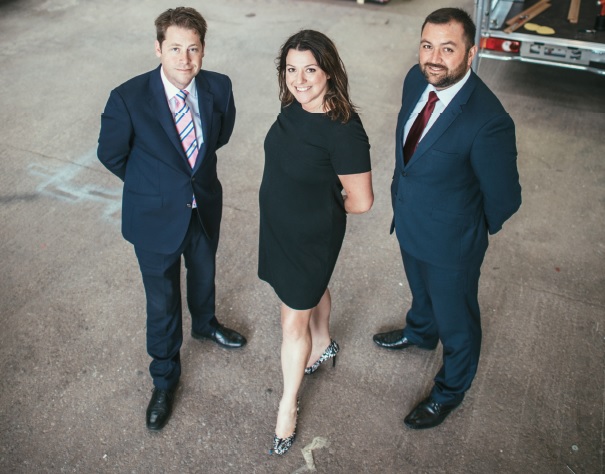
The Trucksmith factory occupies the site of a former dairy in rural Devon; an industry that was once famous in the county but is now sadly in decline following the catastrophic drop in milk prices during recent years. Smart new buildings now stand where the milking sheds once stood and industry thrives, no longer in agriculture, but in the production of specialist vehicles, many of which are destined for the removals industry.
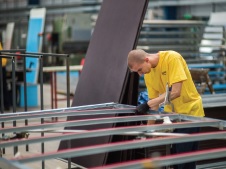 After finding my way to reception I was welcomed with a broad smile and a firm handshake by Trucksmith’s Executive Sales Manager, Simon Partridge. Simon introduced me to Emma Trebble who runs the company with her co director and husband Daniel. As we sat around Emma’s oak Victorian ‘partner’s desk’ she told me how her father-in-law Brian Trebble had started the company back in the early 1980s.
After finding my way to reception I was welcomed with a broad smile and a firm handshake by Trucksmith’s Executive Sales Manager, Simon Partridge. Simon introduced me to Emma Trebble who runs the company with her co director and husband Daniel. As we sat around Emma’s oak Victorian ‘partner’s desk’ she told me how her father-in-law Brian Trebble had started the company back in the early 1980s.
“Brian had served his time as a coachbuilder with a local company but wanted a business of his own,” said Emma. “He began building vehicles in his garage at home with the help of his wife Elizabeth. Customers would come and see him with a ‘fag-packet’ drawing of what they wanted and Brian would build it from that. Things were very different in those days.”
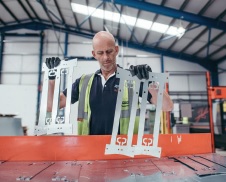 Brian and Elizabeth are still on the Board of Trucksmith as non-executive directors. Their aim had always been to hand over the business to their children - if they were willing and able - and in 2010 their eldest son Daniel, who had previously worked as a chef in London’s Dorchester and Savoy hotels, decided to change direction and join the company. But it was not a matter of simply walking into the boss’s office and taking over, as Emma explained. “Brian and Elizabeth have very high standards and they insisted that Dan learned the trade on the shop-floor before being allowed to take the reins from his father. He completed the Trucksmith apprenticeship and eventually became workshop manager before being appointed managing director seven years ago.”
Brian and Elizabeth are still on the Board of Trucksmith as non-executive directors. Their aim had always been to hand over the business to their children - if they were willing and able - and in 2010 their eldest son Daniel, who had previously worked as a chef in London’s Dorchester and Savoy hotels, decided to change direction and join the company. But it was not a matter of simply walking into the boss’s office and taking over, as Emma explained. “Brian and Elizabeth have very high standards and they insisted that Dan learned the trade on the shop-floor before being allowed to take the reins from his father. He completed the Trucksmith apprenticeship and eventually became workshop manager before being appointed managing director seven years ago.”
Emma’s background is in investment banking and she now uses her commercial skills to head up Trucksmith’s sales and marketing, working closely with Simon Partridge.
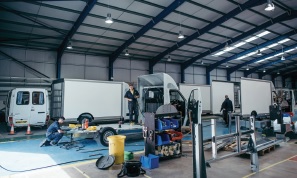 Fifteen years ago the family realised that relying on bespoke vehicle manufacture alone was not going to work in the long-term. A more standard vehicle that could be produced quickly and economically was required. At that time Trucksmith was building a 3.5 tonne low-floor Luton van based on an FWD Renault Master Platform Cab, which was proving popular with customers.
Fifteen years ago the family realised that relying on bespoke vehicle manufacture alone was not going to work in the long-term. A more standard vehicle that could be produced quickly and economically was required. At that time Trucksmith was building a 3.5 tonne low-floor Luton van based on an FWD Renault Master Platform Cab, which was proving popular with customers.
Daniel approached Renault UK and asked if they would consider ordering the LoLoader to sell through their dealer network. After lengthy negotiations and approval testing, Renault not only agreed, but started an ‘off the shelf’ converted range and the LoLoader was to be the first. This was an industry first, led by Renault UK to have converted products available from stock. They ordered their first 27 units and it marked a turning point in the company’s fortunes as Emma explained.
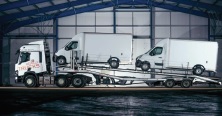 “We were of course delighted, but at the same time a bit scared! Until that point the biggest single order we’d ever had was for six vehicles, so you can imagine how we felt. We had a total workforce of twelve and only seven were on production: how on earth were we going to build them? Fortunately, Devon is a traditional coach building area and we managed to recruit enough skilled people to help us complete both the Renault order and the bespoke work we already had in the order book.”
“We were of course delighted, but at the same time a bit scared! Until that point the biggest single order we’d ever had was for six vehicles, so you can imagine how we felt. We had a total workforce of twelve and only seven were on production: how on earth were we going to build them? Fortunately, Devon is a traditional coach building area and we managed to recruit enough skilled people to help us complete both the Renault order and the bespoke work we already had in the order book.”
Today the Trucksmith workforce stands at 110 with 12 apprentices currently learning the trade.
Within a few years the bespoke work had reduced to about 10% of the company’s turnover and its platform-based products had become a UK market leader.
The company’s close relationship with Renault UK continues to flourish along with similar partnerships with Vauxhall, Fiat, Nissan, Toyota and Peugeot.
 Customers are able to buy from the manufacturers’ franchised dealerships or directly from the factory. “As well as the standard 670 and 741ft3 Lutons, we are able to build customised versions to order, either via the dealer network or directly from the factory,” said Simon. “We currently have 132 variants that are European Whole Vehicle Type Approved, so there is no requirement for an IVA certificate on any of our approved range, which can mean a delay of up to six months.”
Customers are able to buy from the manufacturers’ franchised dealerships or directly from the factory. “As well as the standard 670 and 741ft3 Lutons, we are able to build customised versions to order, either via the dealer network or directly from the factory,” said Simon. “We currently have 132 variants that are European Whole Vehicle Type Approved, so there is no requirement for an IVA certificate on any of our approved range, which can mean a delay of up to six months.”
Simon later gave me a tour of the modern well-lit production facility and pointed out the company’s newly installed computer controlled laser cutting machine. “One of the things that makes us different is we make all the parts for our bodies here in the factory rather than buying them in,” said Simon. “All the steel fittings are designed by our development department and cut from sheets using laser technology. It was a major investment for us but it’s all part of our continual drive to improve our production techniques and stay ahead of the competition.”
“The LoLoader and its derivatives are very popular with removals companies,” said Simon. “They are of course easy to load and don’t need a tail-lift, which reduces weight and maintenance costs. They can be driven by anyone with a car driving licence and they don’t need a tachograph or driver card. Also, parking and access is easier in congested areas like central London for example.”
Two years ago the Trebbles formed a new company to carry out deliveries of the newly completed vehicles. “We’d always had trouble getting our vans delivered by the transport companies, mainly because of their size, so we decided to start our own,” said Simon. “Really Trucks Haulage was launched in 2014 and has been a great success. We now have 18 transporters operating in the UK and Europe, so we’ve solved our own delivery problems and also turned it into a profitable business transporting vehicles for other motor companies.”
Although Trucksmith has grown beyond all recognition during the past 30 years it is still very much a family business and the impression I took away from my visit was of a ‘happy ship’ where people feel appreciated and valued. Even during the last recession, the company retained every member of its workforce, despite the inevitable hardships and difficulties.
Whatever challenges lie ahead for the UK’s economy, Trucksmith is clearly well placed to exploit new opportunities and remain a market leader.
Photos: Top, left to right: Brian Trebble, Emma Trebble and Simon Partridge. various:
Trucksmith now designs and laser cuts many of its own parts; bottom left: Really Trucks Haulage was started in 2014 as a means of delivering to Trucksmith’s customers.
Click here to see the next Editor's Pick